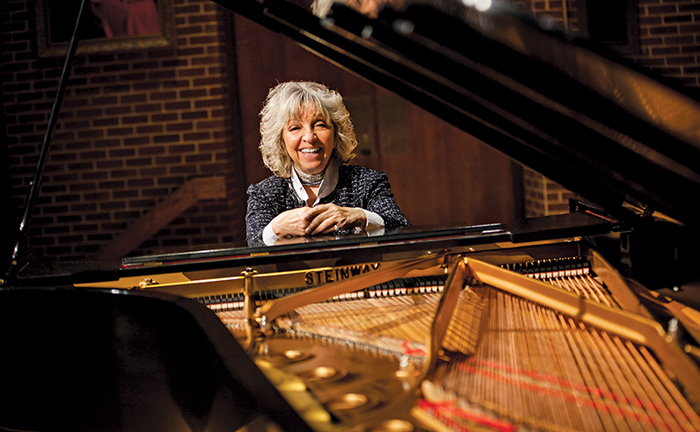Making Music That Matters
- By Suzanne Stanard
- Published

“My music is my legacy, so I have to make statements about the things I believe in.” – Mary Carol Warwick
Mary Carol Warwick has a gift. And it came to light when she was a very young child sitting at her grandmother’s piano.
“Anything we heard on the radio, I could play on the piano,” she said. “Anything. And in any key. That’s when I was four years old.”
She never stabbed at the keys with one finger as young children often do, but instead, always played with two hands.
Warwick’s first public performance came at the age of five.
“One day at Sunday school, the pianist didn’t show up and they asked if there was anyone who could play,” she said. “And when my mom said I could play, they didn’t believe her. But she insisted, and I did it.”
From that point forward, Warwick trained with a series of teachers in her hometown of Lumberton, N.C. Her first piano teacher would play the following week’s song at the end of each lesson. Warwick could come back the next week and play the song, having heard it only once.
“The problem with that is that my ear was so good, I didn’t learn to read the notes,” she said. “After a couple of years of lessons, I started back at the beginning learning to read the music, and that really enhanced my education.”
Then came the teacher Warwick described as “the best thing that had ever happened to me musically at that time.” Evelyn Reynolds was her name, and in addition
to being an accomplished pianist and organist, she was devoted to training the next generation of musicians.
“It must have been what Paris was like in the 1920s,” Warwick said with a little laugh. “Evelyn would gather around her the people she believed were talented and would work with us. We had a little club, and we would go to Wilmington and play in all types of competitions. Her students always placed the highest.
“We were not just pianists,” she said. “We had to learn theory and music history, and we had to go to concerts. She was a broad-based musician and a superb technician at the piano. We were lucky to have her in that little town.”
Warwick trained with Reynolds through high school and decided to continue her music education at Meredith. She credits her professors with opening her eyes to composition and orchestration, which ended up being the foundation of her career.
“All my life I had been writing,” Warwick said. “At Meredith everything jelled. Composing became not just something I understood, but something I mastered. And I enjoyed playing in the chorus, ensembles, and recitals.”
After earning bachelor’s degrees in piano performance and music composition at Meredith, Warwick pursued her master’s degree at Florida State University. She had been accepted into Julliard, but her step-father wouldn’t let her go because he believed New York wasn’t safe.
But, she said, studying at Florida State “turned out to be a really good thing.” Because, in large part, that was where she first crossed paths with Carlisle Floyd, one of the most acclaimed opera composers in America.
He became Warwick’s mentor and friend and continues to influence her career today.
 “Mary Carol is very naturally gifted,” Floyd said. “She has a fine ear, and she loves composing. She didn’t come to me initially as a composer, she came as a pianist, but she quickly let me know about her aspirations to compose. She still comes to me for reaction to her work and solutions to problems. It’s been a long relationship and a very happy one.”
“Mary Carol is very naturally gifted,” Floyd said. “She has a fine ear, and she loves composing. She didn’t come to me initially as a composer, she came as a pianist, but she quickly let me know about her aspirations to compose. She still comes to me for reaction to her work and solutions to problems. It’s been a long relationship and a very happy one.”
After earning a master’s degree in composition from Florida State, and a brief stint as a pianist with a musical group in Las Vegas, Warwick returned to Tallahassee to earn her doctoral degree in composition/theory. She wrote her first opera as her dissertation. And she paid for her education by working as a teaching assistant and accompanist, honing her skills and helping others.
Warwick pursued post-doctoral studies in Floyd’s program at the University of Houston, entrenching herself in the city’s music scene.
She taught music theory and composition at Houston Community College and chaired the music department for seven years, until her retirement from teaching in 2013. During that time she also served for several weeks as artist-in-residence at Meredith, working with music students and watching them perform.
Warwick lives and breathes music. She has produced myriad commissioned works, including operas, instrumental pieces, vocal chamber music compositions, and song cycles, which she describes as “a collection of songs with a thread that ties them all together.”
The sheer volume of her work is staggering, with nearly 60 commissioned pieces and counting.
Above all, Warwick wants her music to make a difference and bring people together. That’s why she wrote “Still We Dance,” a song cycle with lyrics by people with AIDS/HIV; “The Human City,” a piece premiered in New York immediately after 9/11; and “Journey to Song,” a song cycle based on the poetry of breast cancer survivors.
“My music is my legacy, so I have to make statements about the things I believe in,” she said.
Warwick also set the poems of incarcerated youth into the song cycle “Who Am I?” and was recently commissioned by the Houston Grand Opera to write songs based on the stories of U.S. military veterans.
“Mary Carol has always had an interest in people who have had problems in their lives,” Floyd said. “I think she has a special kind of humanity. Certainly not every composer is drawn in that direction, but she likes to combine her creative work with social issues or personal issues so it has meaning beyond just the music.”
Warwick is a featured composer on the CD “An AIDS Quilt Songbook: Sing for Hope,” which features famed cellist Yo-Yo Ma among other well-known artists and performers. Being invited to participate in that project was “one of the highlights of my career,” Warwick said. All of the album’s proceeds are donated to AIDS research.
She also has written numerous operas for children, including “The Velveteen Rabbit,” “The Princess and the Pea,” and several other works commissioned by the Houston Grand Opera. In 2017, her bilingual opera for children, “Cinderella in Spain,” will be performed 40 times by Seattle Opera.
“I want to get children over the notion of opera being a dirty word, so I try to write things that are funny, with beautiful music, so they’ll like singing it,” she said. “If I can get kids to go to one opera, then they may go to another one, and take their children to one, and then we have an audience.”
Among her numerous grants and awards are two Opera New World Grants, a Challenge Grant from the National Endowment for the Arts, and the Mayor’s Proud Partner Award from the city of Houston for her environmental musical, “Celebrate the Earth.” In 2016, Warwick received the Alumnae Career Achievement Award from Meredith College.
“Music is spilling out of my head all the time. Sometimes, my husband and I would be together and my fingers would start
moving on his arm, and he’d ask, ‘What are you playing?’ I’m always playing. It’s just what I do.”
After her husband died in 2013, Warwick didn’t write any music for almost two years.
“I couldn’t hear music. I couldn’t listen to it. I just couldn’t. But now I’m writing again, and I’m really excited to see what’s next.”
News Director
316 Johnson Hall
(919) 760-8087
Fax: (919) 760-8330


3800 Hillsborough Street Raleigh, NC 27607-5298 | (919) 760-8600 Fax: (919) 760-8330 | © 2022 All Rights Reserved.